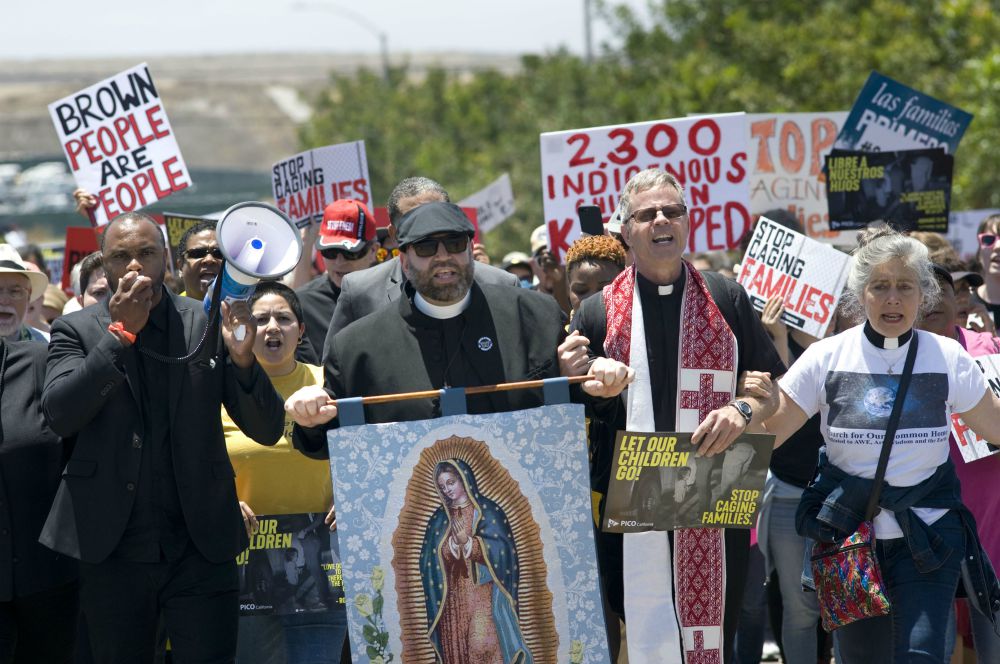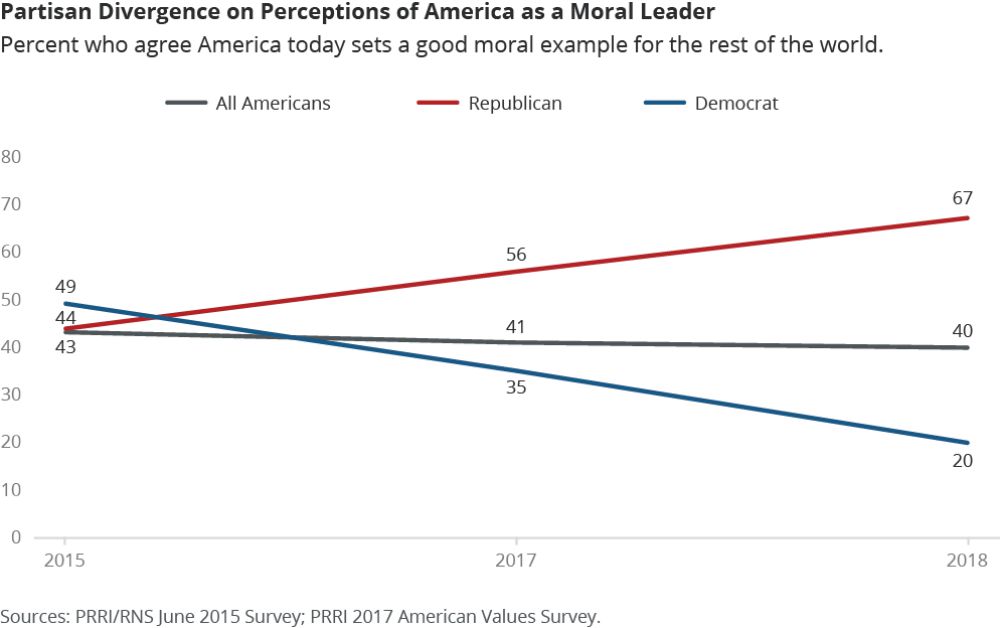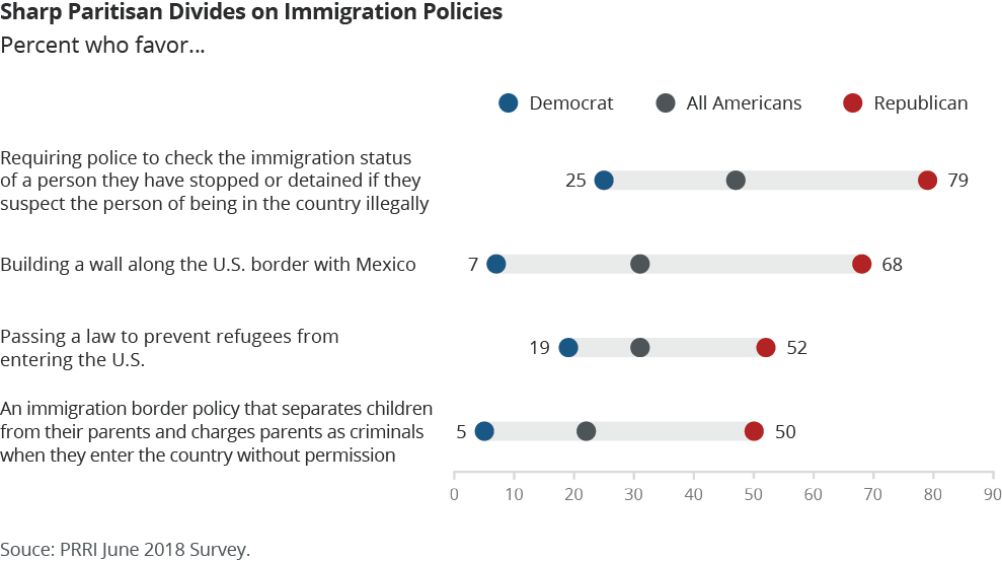
Faith leaders and several hundred supporters march June 23 in San Diego to the Otay Mesa Detention Center during a rally in support of immigrant families who had been separated at the U.S.-Mexico border. (CNS/David Maung)
Most Catholics would be opposed to passing a law to keep refugees from coming to the U.S., while an even stronger majority opposes policies that separate immigrant families at the border, a national survey from the Public Religion Research Institute (PRRI) found.
But in the wake of policies that have restricted refugee admissions, making it more difficult to seek asylum and causing thousands of immigrant children to be separated from their parents, only a slim majority of Catholics (51 percent) do not believe that America sets a good moral example for the rest of the world, PRRI also discovered.
Conducted June 20-24 and published June 26, the survey of Americans' opinions on the nation's immigration policies and moral leadership found deep divisions in society — among and sometimes even within religious groups, political parties, generations and ethnic and racial groups.
For example, asked if the U.S. sets a good moral example for the rest of the world, only 40 percent of respondents said yes, with 58 percent saying it does not. However, fully two-thirds of Republicans (67 percent) approved of America's moral leadership while only 20 percent of Democrats did the same.
This is a sharp departure from two years ago, during the Obama administration, when the percentages of Democrats (49 percent) and Republicans (44 percent) who thought the U.S. was a moral leader were quite similar.
While white evangelical Protestants and white mainline Protestants are nearly the same as Catholics in their views on this question, 60 percent of non-white Protestants and 73 percent of religiously unaffiliated Americans do not think the U.S. is providing a good moral example. The generational divide is also evident, with Americans over age 65 nearly twice as likely as adults ages 18-29 to believe in America's moral leadership (48 percent versus 25 percent).
The survey also questioned Americans about their support of specific immigration policies. Americans in general were evenly divided on whether police should be required to check the immigration status of those they detain, while majorities opposed family separation at the border (71 percent), making conditions so difficult for immigrants that they "self-deport" (67 percent), building a border wall (63 percent), or not admitting refugees (59 percent).
However, even some Americans who did not oppose halting refugee admissions think "the U.S. should provide refuge and protection for people who come to the U.S. when they are facing serious danger in their home country" the report said. Seventy-five percent of Americans, including the majority of Republicans (54 percent), independents (75 percent) and Democrats (90 percent) agree with that statement.

Sources: PRRI /RNS June 2015 Survey/ PRRI 2017 American Values Survey (Public Religion Research Institute)
For each of these questions, dramatic differences existed between political parties and among religious groups, but some policies inspired more widespread opposition than others. On family separation, many more Democrats (94 percent) opposed the policy, but even Republicans were not enthusiastic, with only 50 percent in support of family separation.
All religious groups opposed the policy, although white evangelical Protestants only did so by a slim majority (51 percent) while white mainline Protestants (60 percent), Catholics (74 percent), non-white Protestants (87 percent) and religiously unaffiliated people (82 percent) expressed more opposition.
Republicans were also not dramatic in their support of preventing refugees from entering the U.S., with only 52 percent supporting the idea, while 36 percent oppose it and 11 percent have no opinion. The survey report says it is notable that 10 percent of Americans overall express no opinion on refugee admission.
White evangelical Protestants were divided on excluding refugees, with 44 percent expressing support and the same percentage expressing opposition, while white mainline Protestants (55 percent), Catholics (56 percent), non-white Protestants (63 percent), and religiously unaffiliated (69 percent) Americans opposed passing a law to prevent more refugees from arriving.

Source: PRRI June 2018 Survey (Public Religion Research Institute)
Advertisement
On requiring police to check immigration status and building a southern border wall, Republicans were more strongly supportive, with 79 percent and 68 percent in favor, respectively.
Americans are both divided and skeptical when they consider whom they should trust to handle immigration issues. Democrats in Congress got the greatest vote of confidence, with 38 percent of the public saying they trusted them the most. However, with 14 percent of respondents expressing trust in Republican members of Congress and 21 percent trusting the Trump administration, Republican leaders have nearly 35 percent support.
This still leaves 27 percent of the public who didn't say they had confidence in anyone, with 10 percent expressing no opinion and 17 percent saying there was no one they trusted to deal with immigration.
[Maria Benevento is an NCR Bertelsen intern. Her email address is mbenevento@ncronline.org.]





